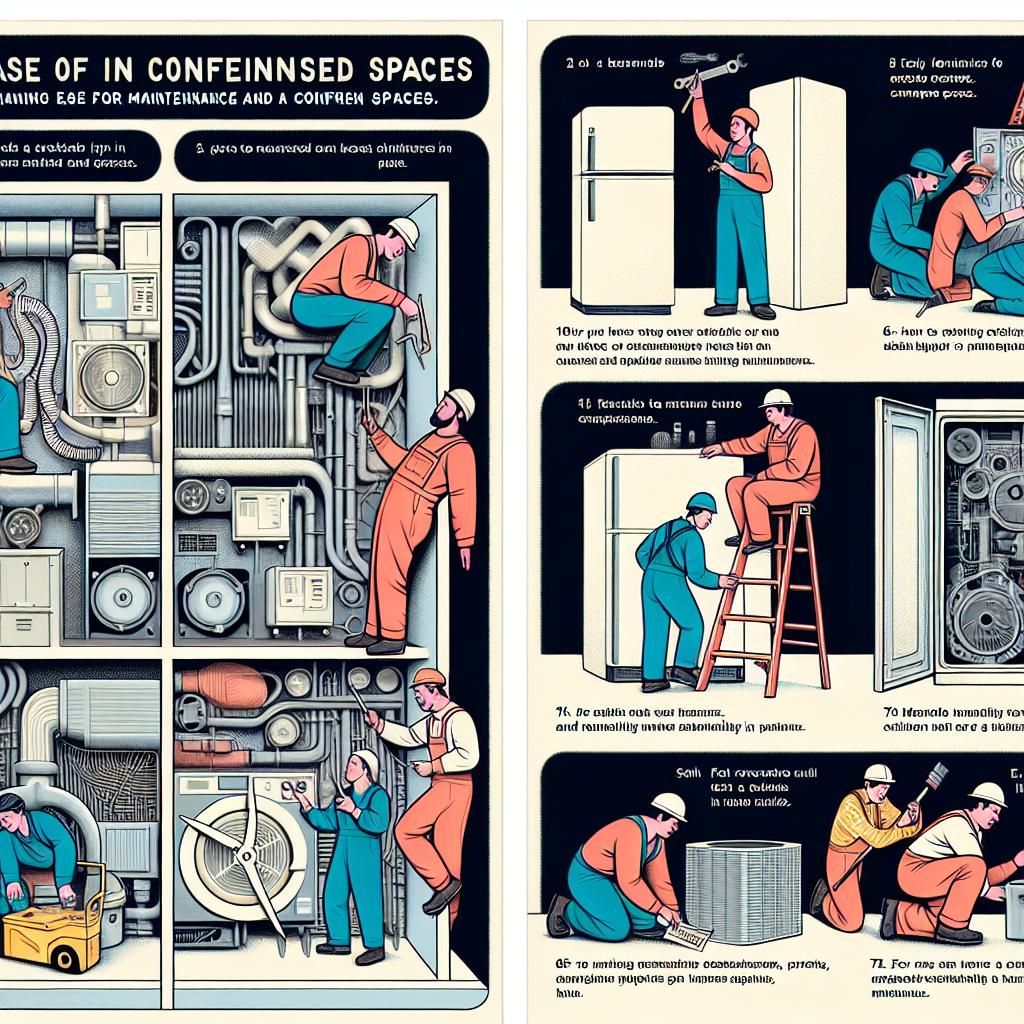In an era where comfort meets efficiency, the installation of mini-split air conditioning systems has emerged as a game-changing solution for homeowners and businesses alike. With their sleek design and remarkable energy efficiency, mini splits are not just a luxury; they are a necessity in modern climate control. However, the challenge often lies in optimizing installation space to fully capitalize on their benefits. Whether you’re working with compact urban apartments, cozy cottages, or sprawling commercial spaces, understanding how to maximize every inch while ensuring optimal performance can make all the difference. In this article, we will explore the best strategies for optimizing and maximizing space for mini split AC installations, guiding you through the nuances of design, placement, and functionality. So, let’s dive into the art and science of creating a perfectly balanced climate for your space!
Understanding the Unique Requirements of Mini Split AC Systems
Mini split AC systems, known for their efficiency and compact nature, have specific installation requirements that differ from traditional HVAC systems. First, it is crucial to consider the placement of the indoor and outdoor units. Indoor units should be located in areas with unobstructed airflow, preferably high on walls, to maximize cooling. Moreover, the outdoor unit needs sufficient clearance for air circulation, so a clear space of at least two feet around all sides is recommended. Neglecting these guidelines may compromise system performance and lead to increased energy bills.
Additionally, careful consideration of electrical requirements is essential for optimal functionality. Each mini split system requires a dedicated electrical line, and installations must comply with local building codes. Properly sizing electrical components can prevent potential hazards such as overheating and electrical failures. To facilitate seamless installation, it’s advisable to consult with a professional to assess the viability of your chosen installation location, ensuring that all elements, from mounting brackets to drainage requirements, are appropriately addressed.

Strategic Placement for Maximum Efficiency and Comfort
When planning for a mini split AC installation, the right positioning can significantly enhance both the efficiency and comfort of your cooling system. Consider placing the indoor unit in a location that maximizes airflow throughout the room. Ideal spots are often near the center of a wall or on a high point, helping maintain a consistent temperature throughout the space. Avoid placing the unit near heat sources, such as sunlight or appliances, which can strain the system and ultimately diminish its performance. Ensure that the unit is not obstructed by furniture or drapery; a clear path for air circulation can help the AC function optimally.
In addition to the indoor placement, the outdoor unit’s location is equally critical. It should be positioned on a stable platform with enough clearance for airflow and maintenance. Key considerations for outdoor placement include:
- Distance from the indoor unit: Keep the line set short to reduce energy loss.
- Exposure to elements: Shield from direct sunlight and heavy rain, yet ensure proper ventilation.
- Accessibility: Make it easy for servicing without obstructing walkways.
A strategic layout not only promotes a harmonious aesthetic but also guarantees your mini split system operates at peak efficiency, ultimately leading to lower energy bills and a more comfortable living environment.

Creating an Aesthetic Balance While Optimizing Space
Creating an aesthetic balance while ensuring functionality is key when installing mini split AC units. Strategically positioning your mini split can enhance the overall look of your space while efficiently optimizing its performance. Consider the following tips for achieving this balance:
- Placement Height: Mount the unit at a height that is both ergonomically pleasing and effective for air circulation.
- Color Coordination: Choose a unit that complements the existing color scheme of your room, making it blend seamlessly with the decor.
- Minimalist Design: Opt for sleek and modern mini split designs that take up less visual space and add to the aesthetic.
- Conceal Ductwork: If possible, incorporate clever concealment strategies for any visible ductwork to maintain a clean and cohesive look.
Furthermore, the surrounding decor can play a significant role in enhancing the aesthetic appeal while optimizing space. Incorporating functional furniture that maximizes room utility will also keep your area from feeling cramped. A few strategies to consider include:
| Furniture Type | Space Optimization Tip |
|---|---|
| Multi-purpose furniture | Utilize items like ottomans that offer storage alongside seating. |
| Wall-mounted shelves | These can save floor space while showcasing decor. |
| Corner units | Maximize usually wasted corner areas for both AC units and storage. |

Essential Tips for Maintenance and Accessibility in Tight Areas
When installing a mini split AC in tight areas, ensuring proper maintenance and accessibility is crucial for long-term performance. Plan for regular check-ups by positioning the indoor and outdoor units where they are easily reachable. Consider placing the unit at a height that allows for unobstructed access without straining during servicing. To further enhance maintenance efficiency, utilize slotted shelving or racks to keep tools and parts organized nearby, minimizing the need to navigate tight spaces when a service is needed.
Additionally, ensure adequate clearance around the units. This includes a minimum clearance of 12 to 18 inches from walls, ceilings, and other obstructions, facilitating airflow and allowing technicians to work comfortably. Here’s a quick guide on recommended clearances:
| Component | Recommended Clearance |
|---|---|
| Indoor Unit | 12-18 inches from walls |
| Outdoor Unit | 24-36 inches from fences/structures |
| Service Access | 36 inches around all sides |
Implementing these strategies not only supports easy maintenance but also promotes optimal performance and energy efficiency of your mini split AC system.
Q&A
Q&A: The Best Ways to Optimize and Maximize Space for Mini Split AC Installation
Q: What is a mini split AC system, and why is it beneficial for space optimization?
A: A mini split AC system is a versatile cooling and heating solution that consists of an outdoor compressor and one or more indoor units. Its compact design allows it to be installed in spaces where traditional HVAC systems might be impractical. Because it requires no ductwork, it can be a game-changer for maximizing interior space while ensuring optimal comfort.
Q: How can I determine the best location for my mini split indoor unit?
A: Choosing the right location is essential for effective airflow and aesthetics. Ideally, the indoor unit should be installed high on a wall, away from furniture and obstructions. Consider rooms with large windows for natural light or spots with minimal traffic to keep the unit secure and unobtrusive. Aim for a central installation point to maximize air distribution across the room.
Q: What types of indoor units are available, and how do they affect space?
A: Mini split systems offer a variety of indoor unit styles including wall-mounted, ceiling-mounted, and floor-standing models. Wall-mounted units are the most common as they save floor space. Ceiling cassettes are excellent for low-profile setups whereas floor-mounted options can fit into narrow spaces. Select a style that complements your room design while maximizing usable space.
Q: Are there any structural considerations to keep in mind during installation?
A: Absolutely! It’s crucial to evaluate wall integrity, electrical access, and refrigerant line routing before installation. Look for sturdy walls that can support the indoor unit and ensure no structural elements, like plumbing or electrical lines, will hinder the installation. Consulting with a professional can help tailor the setup to your specific environment without sacrificing structural integrity.
Q: What are some creative ways to integrate mini split units into the existing décor?
A: Integration is key! Consider using decorative covers or panels to blend indoor units with the room’s interior. You could also paint the unit to match wall colors or incorporate it into built-in shelving for a seamless look. Additionally, positioning plants or artwork around the unit can divert attention while maintaining aesthetics without blocking airflow.
Q: Can I install a mini split AC system myself, or should I hire a professional?
A: While some homeowners are comfortable with DIY projects, mini split installation involves refrigerant lines and electrical work, which can be complex and potentially dangerous. Hiring a licensed professional ensures that the system runs efficiently and complies with local building codes. A pro can also help optimize the design for your specific space, giving peace of mind.
Q: What maintenance tips should I follow to keep my mini split system performing optimally?
A: Regular maintenance is vital for efficiency. Clean or replace filters monthly to ensure unobstructed airflow. Check the outdoor unit for debris and clear any obstructions around it. Also, schedule professional servicing at least once a year to inspect refrigerant levels and overall performance. Keeping your system in top shape means it can efficiently optimize your space while providing comfort.
Q: What overall space benefits can I expect from installing a mini split AC?
A: By choosing a mini split AC system, you can enjoy many space-related benefits including reduced clutter (due to the absence of bulky ductwork), improved air quality, and flexible zoning options that allow for independent temperature control in different areas of your home. This results in enhanced comfort without compromising valuable square footage.
Insights and Conclusions
optimizing and maximizing space for your mini split AC installation is more than just a practical necessity; it’s an exercise in creativity and efficiency. By carefully considering your room’s layout, utilizing vertical spaces, and selecting the right placement for both the indoor and outdoor units, you can transform your living space into a comfortable oasis without compromising on aesthetics or functionality. Armed with these tips and strategies, you’re now equipped to make informed decisions that not only enhance the cooling performance of your system but also contribute to a harmonious living environment. Embrace the possibilities, and let your mini split AC be a seamless part of your home, ensuring comfort even in the tightest of spaces. After all, great things can come in small packages—especially when those packages are efficiently cooled!

